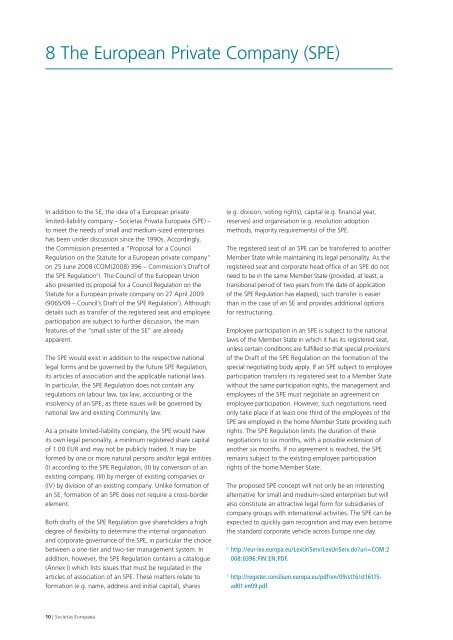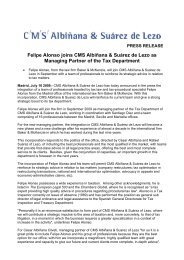Societas Europaea - CMS Legal
Societas Europaea - CMS Legal
Societas Europaea - CMS Legal
You also want an ePaper? Increase the reach of your titles
YUMPU automatically turns print PDFs into web optimized ePapers that Google loves.
8 The European Private Company (SPE)<br />
In addition to the SE, the idea of a European private<br />
limited-liability company – <strong>Societas</strong> Privata <strong>Europaea</strong> (SPE) –<br />
to meet the needs of small and medium-sized enterprises<br />
has been under discussion since the 1990s. Accordingly,<br />
the Commission presented a “Proposal for a Council<br />
Regulation on the Statute for a European private company“<br />
on 25 June 2008 (COM(2008) 396 – Commission’s Draft of<br />
the SPE Regulation 6 ). The Council of the European Union<br />
also presented its proposal for a Council Regulation on the<br />
Statute for a European private company on 27 April 2009<br />
(9065/09 – Council’s Draft of the SPE Regulation 7 ). Although<br />
details such as transfer of the registered seat and employee<br />
participation are subject to further discussion, the main<br />
features of the “small sister of the SE” are already<br />
apparent.<br />
The SPE would exist in addition to the respective national<br />
legal forms and be governed by the future SPE Regulation,<br />
its articles of association and the applicable national laws.<br />
In particular, the SPE Regulation does not contain any<br />
regulations on labour law, tax law, accounting or the<br />
insolvency of an SPE, as these issues will be governed by<br />
national law and existing Community law.<br />
As a private limited-liability company, the SPE would have<br />
its own legal personality, a minimum registered share capital<br />
of 1.00 EUR and may not be publicly traded. It may be<br />
formed by one or more natural persons and/or legal entities<br />
(I) according to the SPE Regulation, (II) by conversion of an<br />
existing company, (III) by merger of existing companies or<br />
(IV) by division of an existing company. Unlike formation of<br />
an SE, formation of an SPE does not require a cross-border<br />
element.<br />
Both drafts of the SPE Regulation give shareholders a high<br />
degree of flexibility to determine the internal organisation<br />
and corporate governance of the SPE, in particular the choice<br />
between a one-tier and two-tier management system. In<br />
addition, however, the SPE Regulation contains a catalogue<br />
(Annex I) which lists issues that must be regulated in the<br />
articles of association of an SPE. These matters relate to<br />
formation (e.g. name, address and initial capital), shares<br />
10 | <strong>Societas</strong> <strong>Europaea</strong><br />
(e.g. division, voting rights), capital (e.g. financial year,<br />
reserves) and organisation (e.g. resolution adoption<br />
methods, majority requirements) of the SPE.<br />
The registered seat of an SPE can be transferred to another<br />
Member State while maintaining its legal personality. As the<br />
registered seat and corporate head office of an SPE do not<br />
need to be in the same Member State (provided, at least, a<br />
transitional period of two years from the date of application<br />
of the SPE Regulation has elapsed), such transfer is easier<br />
than in the case of an SE and provides additional options<br />
for restructuring.<br />
Employee participation in an SPE is subject to the national<br />
laws of the Member State in which it has its registered seat,<br />
unless certain conditions are fulfilled so that special provisions<br />
of the Draft of the SPE Regulation on the formation of the<br />
special negotiating body apply. If an SPE subject to employee<br />
participation transfers its registered seat to a Member State<br />
without the same participation rights, the management and<br />
employees of the SPE must negotiate an agreement on<br />
employee participation. However, such negotiations need<br />
only take place if at least one third of the employees of the<br />
SPE are employed in the home Member State providing such<br />
rights. The SPE Regulation limits the duration of these<br />
negotiations to six months, with a possible extension of<br />
another six months. If no agreement is reached, the SPE<br />
remains subject to the existing employee participation<br />
rights of the home Member State.<br />
The proposed SPE concept will not only be an interesting<br />
alternative for small and medium-sized enterprises but will<br />
also constitute an attractive legal form for subsidiaries of<br />
company groups with international activities. The SPE can be<br />
expected to quickly gain recognition and may even become<br />
the standard corporate vehicle across Europe one day.<br />
6 http://eur-lex.europa.eu/LexUriServ/LexUriServ.do?uri=COM:2<br />
008:0396:FIN:EN:PDF.<br />
7 http://register.consilium.europa.eu/pdf/en/09/st16/st16115-<br />
ad01.en09.pdf.





